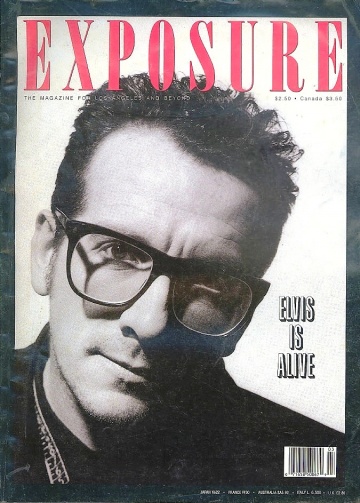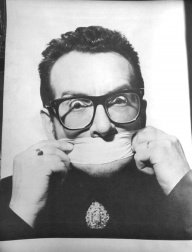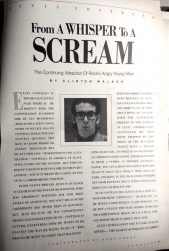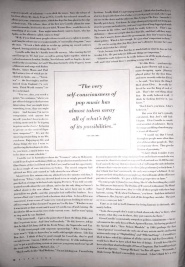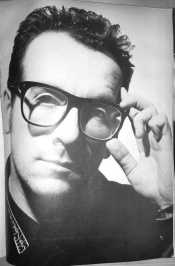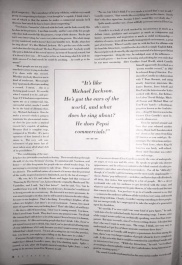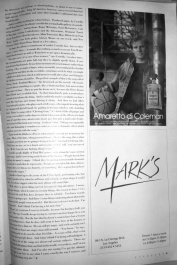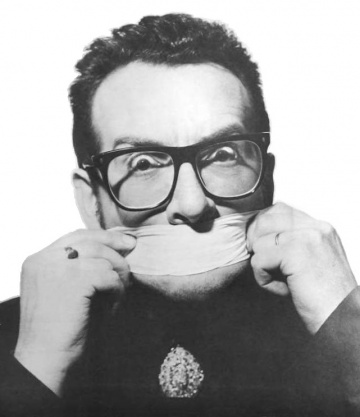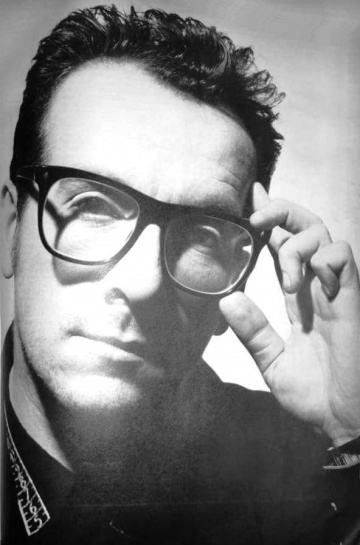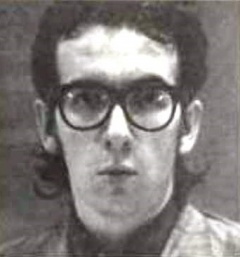Exposure, April 1989: Difference between revisions
(add transcribed text) |
|||
| Line 19: | Line 19: | ||
Elvis Costello has always had a reputation for being "difficult." He refuses, as he would undoubtedly claim himself, to be but a pliant pop star akimbo with his two-dimensional image. But is a real person whose music is about real life. | Elvis Costello has always had a reputation for being "difficult." He refuses, as he would undoubtedly claim himself, to be but a pliant pop star akimbo with his two-dimensional image. But is a real person whose music is about real life. | ||
Elvis Costello isn’t one to take an easy option — the easiest of which is to | Elvis Costello isn’t one to take an easy option — the easiest of which is to simply repeat yourself, ad infinitum – or to shirk the issues. Since the release of his first album ''My Aim Is True'' in 1976, Costello has released virtually an album per year, sometimes more, which has kept his fans glued to the edge of their seats. The release, then, of the first new Costello album for some eighteen months, his first for his new label, Warner Bros., would have to be something of an event. Fans might immediately want to know, why has ''Spike'', as the album is called, taken so long? | ||
“Well, if you think most people release records every eighteen months, and I maybe release one every nine months, it’s not really a long time,” says the man. “It took a little while to set this up, getting my recent contract aligned, boring practical things like that.” | |||
Costello adds that he’s hardly been idle anyway. After touring the US and Europe in ’87, last year, as well as getting ''Spike'' together, which involved sessions in London, Dublin, New Orleans, and Los Angeles, he married for the second time, to Cait O’Riordan (formerly of the Pogues), wrote a filmscore and songs with Ruben Blades, Aimee Mann and Paul McCartney (two of which are included on ''Spike'', one – “Veronica” – the first single); and has moved from England (“a very tatty, Third World country”) to live in Ireland. | |||
“You see, also, you reach a point,” he continues, “where you get offered things to do that seem interesting, that you might learn something from, that you might enjoy. And because I’m not in competition with anyone but myself, you don’t have to do everything motivated by ‘Is it going to get me on the charts? Is it going to get me on the cover of ''Exposure'' magazine?” It’s not the most important thing in my life, you know. Enjoying my life, and doing things the way I want to, and having the freedom to do that, is, you know, a much better way to be than on some schedule.” | |||
Costello was in Australia to shoot the “Veronica” video in Melbourne (with Evan English and Johnny Hillcoat, the production team that made the film ''Ghosts of the Civil Dead'' with Nick Cave) and he took the opportunity to do a couple of rare interviews in Sydney. The record company had advised me Elvis only wanted to “talk about the new album.” | |||
About forty-five minutes into my allotted forty-five minutes with him, I had to say “Elvis,” (who was dressed head to toe in crisply-pressed black perched on a lounge in his hotel suite sipping Perrier), “I was told you only wanted to talk about the new album, and so far the only thing we haven’t talked about is the new album.” Elvis has never been one to suffer journalists too gladly, and this journalist has ruffled his feathers. In a review of last year’s music I took a facetious shot at him. As far as Elvis was concerned, it was a case of “some very cynical person deciding to write me off in a couple of lines because I’m past my Use-By date.” Whether or not it was meant as that or not (and it wasn’t) Costello was off and running. He decided to fill me in on his view of the current scene. And he wasn’t going to stop until he was finished. | |||
“The scene itself … I get to the point where I know things I like, and they’re private to me. And I don’t tell anybody.” He did, however, tell me that he liked DJ Jazzy Jeff & the Fresh Prince, the Sugarcubes and Yaz. | |||
“I only trust people with corporate sponsorship” (Who’s being facetious now?) “I like to know they’re really solid upright citizens. Like Jon Bon Jovi. I think if they’re good enough for Coca-Cola, they’re good enough for me. I mean, I think you’re safe that way. It’s like making sure you’ve got a good locking system on your car, you pretty much can’t go off the road with Whitney, Michael, Jon…” | |||
“But I really do like “Bad Medicine,” I’m not kidding you. I’m not being facetious. I really think it’s a great pop record. I think that Jon Bon Jovi’s a lot less despicable than a lot of other very arch people around, who’ve got one eye on the charts and the other on, like, being in ''The Face''. I mean he’s literally got it down. You know, he sings about partying and not being put down by parents and authority, and you’ve got lots of long-legged girls with big breasts in the video, and I think he really believes it. That’s one definition – there are people that live that life, and that’s all they want. They don’t want to know about the government, they don’t want to hear about politics. Which is fair enough. It’s just what’s important to them.” | |||
So you’re saying that Jon Bon Jovi isn’t offensive because he’s not cynical about what he’s doing? | |||
“Yeah, because Jon Bon Jovi has as much faith in what he does as I do in what I do. He just believes different things are important.” | |||
“I think he really believes it, he really believes in all the myths of rock n’ roll, and I don’t think there’s anything wrong with that.” | |||
“It’s like Elvis … you know the thing James Burton said to me – name-dropping again (Burton played guitar for the first Elvis, and more recently with this Elvis) – he said, ‘You know the thing I liked about Elvis… he really believed he was the King of rock n’ roll. That’s the cool thing about him. He really believed it all. I think he fucking died for it, you know.’” | |||
“But I don’t, you know, I don’t believe it.” | |||
But even if it isn’t cynically calculated, Bon Jovi’s still bubblegum. Elvis Costello is considered an artist of substance. But in the image-paddling of modern pop, is it not all illusory? | |||
“I would say that I break through to people more often than a lot of these other people do. They never get any closer. They give the illusion of proximity.” | |||
“I don’t think it makes it any less real to just write the songs and play them and release records the way you want to, than it is to stand on stage and look out and see 15,000 facsimiles of yourself, the way that in so many rock n’ roll songs the only definition of them is that everyone wants to be them [the performer] or fuck them. I don’t think that that’s necessarily the only way a singer’s defined. It can be just one little thing that person might say that will make all the effort you put into it worthwhile. It’s just a different perspective on fame.” | |||
{{cx}} | |||
Revision as of 21:45, 19 January 2023
|
